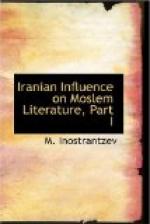Tabari was a most prolific author and is reported to have written daily forty sheets for forty years. He was of pure Iranian descent G.K.N.]
[Sidenote: Tabari’s method.]
Abu Jafar Muhammed bin Jarir born in the winter of 839 at Amul not far from the Caspian Sea in the Persian Province of Tabaristan, hence called Tabari, and who died in Baghdad on the 17th February 923, wrote many, partly very large, works in the Arabic language, among them an extremely voluminous chronicle, which reaches from the creation down to nearly the close of his life. Tabari, mainly occupied with theological tradition, was no man of original research or of historical acumen even in the sense applied to a few other Persian scholars in those centuries. His annals are a compilation, a mass of rich material put together with extraordinary industry. He does not work into unity the various versions in his divergent sources, but simply brings them up in order one after another. But it is just this circumstance which considerably enhances in our eyes the value of the work; for in this way the older reports themselves are preserved more faithfully than if the chronicler had laboured to reconcile them one with the other.
[Sidenote: Abounds in extracts from Arab and Iranian predecessors, but does not mention his sources.]
The principal value of Tabari’s compilation consists in the extremely exhaustive presentation of the history of Islam from the first appearance of the Prophet; no other Arabic work in this respect can compare with his. The pre-Islamic history comprises, may be, a twentieth portion of the whole work and gives a very groat deal of what we would rather be without. Of the highest moment, however, is the tolerably detailed section on the history of the Sasanides and their times embodied in it, and whose German translation forms the text of our book. This section goes back partly to good Arabic records and mostly, at least mediately, to very important ancient Persian sources. But the stories from the mythological and historical traditions which appear scattered in Tabari in proceeding sections have a cognate origin. If the criticism of the sources is here very much facilitated on the one hand, because these orientals where they excerpt love to adhere, as far as possible, to the letter of their models or sources, it is on the other, rendered difficult because Tabari does not mention his immediate authorities. Only in reports of theological interest, to which the whole of the history of the growth of Islam belongs, he proceeds to indicate his sources with precision; otherwise he cites at the best an old authority come down to him only obliquely, and in most cases none at all. Throughout the Persian history he never names an authority, barring Hisham, whom he quotes here and there and who was an acknowledged authority in another province of tradition.
[Sidenote: Story of Persia based on indigenous original work.]




